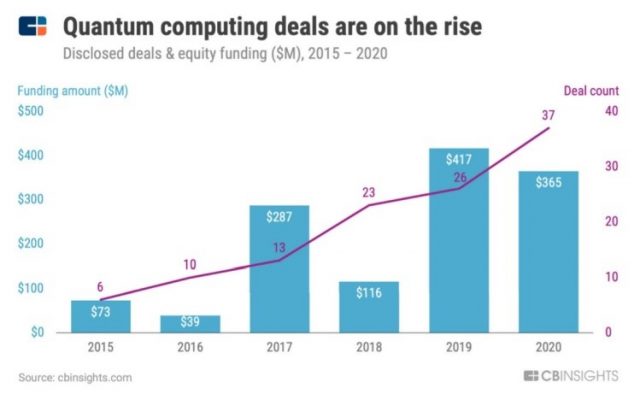Quantum computing has captured imagination of scientists for several decades. It is only in recent times that the much-talked area is witnessing attention from deep-pocketed investors, too. Although last year’s investment was 1.02 billion USD into the quantum computing industry, it is more than those of the three previous years combined.
With over 200 start-ups now, the number has almost doubled in the past decade. It is expected to witness significant interest in the next few years driven by the rapidly changing technology sector. The three decade old field is moving from a merely scientific endeavour into a burgeoning industry.
Management Consultancy multinational, Boston Consulting Group in 2021 had said that investors were transitioning towards increased spending on quantum computing and that such systems would be solving challenges beyond the reach of traditional computers. Its research report titled ‘What Happens When If Turns to When in Quantum Computing?’ has predicted the quantum computing to unlock new value across several industries and to create about 850 billion USD in value a year by 2040.
Companies such as Google, IBM, Honeywell, IonQ, Microsoft, and PsiQuantum are showing the way forward to the growth of investments in the sector. Furthermore, Chinese company Huawei Technologies Co and Alibaba are also providing free platforms for people to develop quantum algorithms.
Quantum computing can enable researchers approach fields like pharmaceutical drug research, cybersecurity, weather forecasting and computational chemistry in a fresh manner. In a complex area of physics, Quantum Computing explores behaviour of subatomic particles – particles that are smaller than atoms, the basic building blocks of all matter. Such computers use a different basic memory unit – a qubit. According to physicists in China, a recently launched quantum computer takes 1 millisecond for performing a task that can take a normal computer about 30 trillion years.
Applications
Quantum sensors can help guide devices to operate independently for months without GPS signal. Besides performing extremely quick calculations, quantum internet can transmit messages ensuring ultra-secure communications.
Researchers are also looking at climate applications as well as proposing high-speed quantum computing simulations that can facilitate creation of efficient batteries and find ways to reduce emissions.
The new domain possesses the capabilities of revolutionizing the drug discovery process, facilitating deciphering codes for security purposes, and so much more.
Financial giants such as JP Morgan, Goldman Sachs and Wells Fargo are all investigating potential of quantum computers to improve efficacy of banking operations.
A very interesting application of Quantum computing can be helpful in reducing congestions, as traditional computers may find it challenging to assess different scenarios at the same time. Microsoft is already working with Toyoto Tsusho and quantum computing startup, Jij Inc. It was observed during the experiment has that the quantum-inspired algorithms can bring down traffic wastage time by 20 per cent.
Market Opportunity
A report published by Allied Market Research in 2020 estimated that the global enterprise quantum computing market would reach 18.33 billion USD by 2030, witnessing a CAGR of 29.7 per cent vis-à-vis 1.37 billion USD in 2020.
Another report released by research firm IDC has estimated that spending on quantum computing will grow to 8.6 billion USD in 2027, from 412 million USD in 2020, witnessing a CAGR of 50.9 per cent over the period. This will include core quantum computing as a service as well as enabling and adjacent quantum computing as a service.
Research firm Gartner anticipates that nearly 40 per cent of large companies are expected to be in quantum-computing initiatives by 2025.
2021 – A Game Changer Year for Quantum Computing
The year 2021 was one of the landmark years for Quantum Computing as the sector witnessed unimaginable leap forward both in terms of investments as well as activities.
Technology major IBM believes that Quantum computing will be a 3 billion USD market in near-term value creation with 2023 being an inflection point. In a recent report by the IT major called ‘Quantum Decade’, it estimates that that there are currently just 3,000 skilled workers in the domain and the base needs to be doubled or quadrupled for exploiting complete potential and ensuring businesses aren’t left behind. The company is investing in quantum developer certification as well as educational programs and investments in university curriculum to empower diverse workforce and enabling quantum computing skills to flourish.
French company Pasqal in June 2021 confirmed building a 1,000-qubit quantum processor, which would be ready by 2023 enabling complex calculations and had raised 25 million Euros to bring this into fruition. The firm also confirmed to be working with French energy major EDF to apply quantum computing to issues such as calculating adequate manner of charging electric vehicles fleet as well as reducing overall time taken. The funding was also the largest raised by a European quantum start-up beating the 14.6 million pound Series A round raised by quantum software company Riverlane in January 2021.
Auto major BMW believes that quantum computers have the potential for optimising placement of sensors on cars, employ AI in quality checks and predict metal deformation patterns. Furthermore, Aerospace giant Airbus, financial services company PayPal as well as consumer electronics maker LG Electronics are the commercial businesses aiming to harness machines for refining material science, monitor payment and streamlining logistics.
Hardware maker Honeywell Quantum Solutions merged with software company Cambridge Quantum, forming Quantinuum. In the joint venture, Honeywell is expected to invest between 270 and 300 million USD.
Japanese corporation Mitsubishi Chemical Corporation has commenced taking software services from Quantum chemistry software start up as it can help engineers find improved solar panel materials, plastics and electric vehicle batteries.
The first pure-play quantum computing firm went public through special purpose acquisition company, IonQ, with a valuation of 2 billion USD. Another such firm Supernova Partners Acquisition Company II Ltd. will be taking quantum start-up Rigetti Computing public. Rigetti Computing, which develops hardware and software for quantum computers, closed a C round for 79 million USD. The company was valued at 1.5 billion USD.
PsiQuantum, founded by British physicists in Silicon Valley, announced a giant 450 million USD funding round from the world’s largest investment company, BlackRock, valuing it at a mammoth 3 billion USD. The start-up is aiming to build a commercially viable quantum computer.
There is also a murmur that Alphabet is moving towards Quantum Computing through Sandbox Technology in 2022. The above activities demonstrate significant investor appetite as private financing in quantum technology start-ups surpassed 1.7 billion USD in 2021.
In Australia, Quantum Brilliance, a venture-backed Australian-German full-stack quantum accelerator startup, in August 2021 confirmed on closing 9.7 million USD seed investment co-led by the QxBranch founders’ and Main Sequence investment consortium. This reflects Australia’s seriousness in foraying into the nascent industry.
Israeli startup Quantum Machines raised 50 million USD in 2021 from a clutch of investors including Red Dot Capital Partners with Samsung NEXT, Valor Equity Partners amongst other investors.
Toronto-based start-up Xanadu Quantum Technologies Inc., which aims to commercialize quantum computing using particles of light, raised 100 million USD in new funding in 2021 from Bessemer Venture Partners, one of Silicon Valley’s oldest such firms.
Ambitious Countries
Mckinsey in December 2021 had confirmed that China and the European Union led public funding for quantum computing.
French President Emmanuel Macron in January 2021 had announced a national quantum strategy, with a budget of 1.8 billion Euros. As a follow up to the strategy, the French government launched a new programme for linking quantum machines and supercomputers in January 2022 with about 170 million Euros of funding.
Israel in 2021 announced that it was joining the global race for Quantum Computing as its Ministry of Defense and Innovation Authority is looking at bids from businesses, universities as well as multinationals for 60 million USD project to make a super computer.
The Australian Prime Minister in November last year emphasized the country’s greater focus on quantum technologies as it aims to allocate 111 million AUD over the next few years to support growth of the industry.
The United Kingdom in November 2021 had also confirmed CryoConsortium and QEC project backing other new quantum projects with 40 million Pound for detecting gas leaks in hydrogen industry, quantum clocks for GNSS satellite timing as well as machine learning to control various types of qubits. Its National Quantum Technologies Programme commenced in 2014 and is a strategic funder for the UK quantum industry.
The White House announced 1 billion USD investments into two of the most promising technological frontiers, AI and quantum computing in 2020. However, it lags behind China’s 3,000 patents on quantum technology.
Canada in 2021 had begun the roll-out of national investment strategy of an over 100 million CAD in quantum technologies.
VC Investments
Investments in Quantum Computing by Venture Capital firms have surged by 500 per cent in about 5 years climbing from just 6 deals amounting to 73 million USD in 2015 to 365 million USD, reflecting the increasing confidence of investors in this emerging technology.


Quantum Computing in India
Recently, CEO of IBM, Arvind Krishna had said that Quantum Computing will be big within 5 years and that people must learn it as it would give them advantage when the computers become powerful.
Mr Krishna’s vision looks pragmatic for India, as the government has introduced a Quantum Simulator, which would enable Indian developers and students explore scope of quantum computing’s effects on the economy. In the budget of 2020, the Finance Minister had announced an allocation of Rs. 8,000 crore for the next five years towards the National Mission on Quantum Technologies and Applications.
India has a national programme named Quantum-Enabled Science and Technology, where researchers from institutions like the Indian Institute of Science, Indian Space Research Organisation and Tata Institute of Fundamental Research, have been working on quantum computing and allied areas.
In late December 2021, the Indian Army set up a quantum computing laboratory and centre for artificial intelligence at a military engineering institute in Madhya Pradesh’s Mhow. This would be carrying out extensive research in developing transformative technologies for usage in the armed forces.
The state of Gujarat has stepped on the gas by announcing its Ultra-High-Tech project around the Vibrant Gujarat Global Summit 2022. This would be the first quantum computing technology park of India. The research firm, Innogress, had confirmed on setting up the Greater Karnavati Quantum Computing Technology Park at Gandhinagar.
The above announcement has come three months after China announced constructing its first Quantum Computing Industrial Park at Hefei, capital city of East China’s Anhui province.
Recent Developments
French consulting and technology services Capgemini recently announced setting up of quantum computing Lab, Capgemini Q-Lab, which would be harnessed for building quantum application.
European Country, Finland in January 2022, announced funding an innovation project, VTT Technical Research Centre of Finland, for building the country’s first quantum computer. Finland already ranks high on technological advancement globally.
The present and immediate future looks promising and interesting in the area of quantum computing globally.


